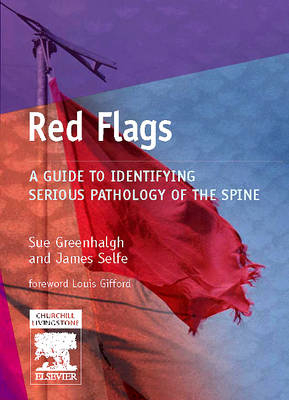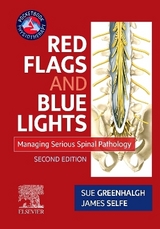
Red Flags
A Guide to Identifying Serious Pathology of the Spine
Seiten
2006
Churchill Livingstone (Verlag)
978-0-443-10140-3 (ISBN)
Churchill Livingstone (Verlag)
978-0-443-10140-3 (ISBN)
- Titel erscheint in neuer Auflage
- Artikel merken
Zu diesem Artikel existiert eine Nachauflage
Serious pathology accounts for only 1 per cent of back pain in the general population, however, if you work within musculoskeletal medicine, at some stage, you can see a patient with serious pathology. This guide identifies and acts on warning signs when a therapist becomes suspicious of serious pathology in a patient presenting with back pain.
Serious pathology accounts for only 1% of back pain in the general population, however, if you work within musculoskeletal medicine, at some stage, you will see a patient with serious pathology. Red Flags is the essential guide to correctly identifying and acting on warning signs when a therapist becomes suspicious of serious pathology in a patient presenting with back pain. This handy pocketbook offers practical strategies for developing clinical reasoning so that therapists are able to distinguish between Red Flags and Red Herrings along the patient journey, and have greater confidence in their diagnosis.Drawing on their years of experience and personal case studies, Greenhalgh and Selfe, present a truly innovative guide. They introduce:a hierarchy of Red Flagsan 'Index of Suspicion'thoughts on Red Herringsa model of 3D thinkingthe consideration of conditional probabilitiesLog-on to http://evolve.elsevier.com/Greehalgh/redflags to gain free access to a downloadable wall chart of the Red Flag Hierarchy and the authors' Physiotherapy journal articles
The book's small, portable size makes it ideal for reference in any practice setting.
Presents information in an accessible, at-a-glance format.
The unique red flag hierarchy assists with clinical reasoning.
Index of Suspicion highlights the most likely conditions indicated by specific red flags.
Discussion of 3D thinking encourages clinicians to look beyond immediate symptoms to find the underlying cause of a problem.
Discussion of red herrings describes how to approach indicators that may mislead a diagnosis.
Information on the concept of conditional probabilities helps practitioners make informed clinical decisions.
Serious pathology accounts for only 1% of back pain in the general population, however, if you work within musculoskeletal medicine, at some stage, you will see a patient with serious pathology. Red Flags is the essential guide to correctly identifying and acting on warning signs when a therapist becomes suspicious of serious pathology in a patient presenting with back pain. This handy pocketbook offers practical strategies for developing clinical reasoning so that therapists are able to distinguish between Red Flags and Red Herrings along the patient journey, and have greater confidence in their diagnosis.Drawing on their years of experience and personal case studies, Greenhalgh and Selfe, present a truly innovative guide. They introduce:a hierarchy of Red Flagsan 'Index of Suspicion'thoughts on Red Herringsa model of 3D thinkingthe consideration of conditional probabilitiesLog-on to http://evolve.elsevier.com/Greehalgh/redflags to gain free access to a downloadable wall chart of the Red Flag Hierarchy and the authors' Physiotherapy journal articles
The book's small, portable size makes it ideal for reference in any practice setting.
Presents information in an accessible, at-a-glance format.
The unique red flag hierarchy assists with clinical reasoning.
Index of Suspicion highlights the most likely conditions indicated by specific red flags.
Discussion of 3D thinking encourages clinicians to look beyond immediate symptoms to find the underlying cause of a problem.
Discussion of red herrings describes how to approach indicators that may mislead a diagnosis.
Information on the concept of conditional probabilities helps practitioners make informed clinical decisions.
1. Red Flags
2. Clinical Reasoning
3. Subjective Examination: Age, Previous Medical History and Lifestyle Questions
4. Subjective Examination: Questions about the Current Episode and Pain
5. Objective Examination
6. Conclusion
| Erscheint lt. Verlag | 22.2.2006 |
|---|---|
| Reihe/Serie | Physiotherapy Pocketbooks |
| Vorwort | Louis Gifford |
| Verlagsort | London |
| Sprache | englisch |
| Maße | 102 x 152 mm |
| Themenwelt | Medizinische Fachgebiete ► Chirurgie ► Unfallchirurgie / Orthopädie |
| ISBN-10 | 0-443-10140-X / 044310140X |
| ISBN-13 | 978-0-443-10140-3 / 9780443101403 |
| Zustand | Neuware |
| Informationen gemäß Produktsicherheitsverordnung (GPSR) | |
| Haben Sie eine Frage zum Produkt? |
Mehr entdecken
aus dem Bereich
aus dem Bereich
Buch | Softcover (2023)
Urban & Fischer in Elsevier (Verlag)
CHF 85,40
für Studium und Praxis unter Berücksichtigung des …
Buch | Softcover (2022)
Medizinische Vlgs- u. Inform.-Dienste (Verlag)
CHF 39,20



